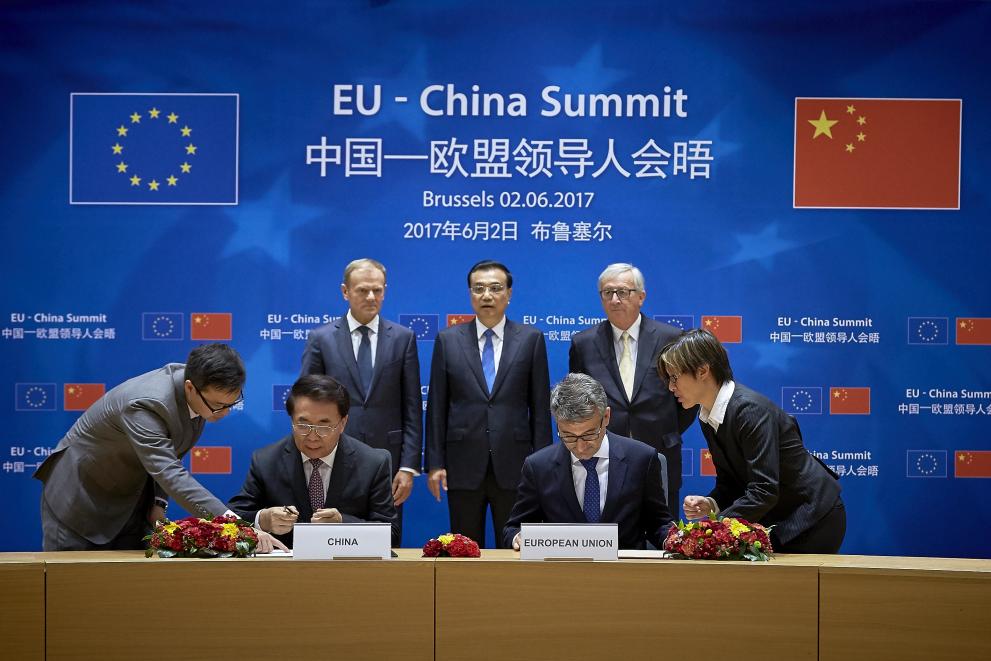
On 2 June 2017, the JRC, represented by Director-General Vladimir Šucha, and the Chinese Academy of Sciences (CAS), represented by its President, Professor Bai Chunli, signed a Research Framework Arrangement. The ceremony took place in the framework of the EU-China Summit 2017.
The new framework arrangement will focus on areas linked to the EU–China Strategic Agenda 2020 for Cooperation, and in particular on air quality, renewable energy, climate, environmental protection, digital economy, regional innovation policy, smart specialisation and support to evidence informed policies.
The JRC also participated in the 3rd EU-China Innovation Cooperation Dialogue co-chaired by Carlos Moedas, Commissioner for Research, Science and Innovation, and Wan Gang, China's Minister of Science and Technology, which took place in the margins of the EU-China summit. JRC Director Delilah Al Khudhairy presented the ongoing cooperation and future activities with key scientific players such as the Chinese Academy of Sciences and the Academy of Sciences and Technology for Development.
A joint technical workshop to kick off the collaboration under the new arrangement in the area of smart grids research, took place on 30-31 May 2017, at JRC premises in Ispra (Italy).
Existing JRC collaboration with Chinese partners
The JRC is actively contributing to the implementation of the EU-China Strategic Agenda 2020 for Cooperation as well as to the EU-China High level Innovation Cooperation Dialogue.
The new arrangement is building upon the existing longstanding and successful cooperation with a number of CAS institutes, particularly the Institute of Remote Sensing and Digital Earth – Chinese Academy of Sciences (CAS-RADI) with which the JRC signed a collaborative arrangement during the EU-China Summit in 2015.
One of the ongoing projects in the field of disaster risk management involves establishment of a China Human Settlement joint research task to develop advanced algorithms and analysis tools to map human settlements in China as well as globally, by exploiting satellite data. This scientific collaboration also includes benchmarking remote sensing sensors and methodologies, as well as generating products and information of relevance for disaster risk reduction and resilience, environmental analysis, and sustainable cities/ human settlements applications. These algorithms are now used by CAS-RADI to analyse built-up areas across China.
The two partners have also developed a shared vision of next generation spatial data infrastructures, known as Digital Earth. Digital Earth is a participative framework to share information about the state of our planet and about the complex interactions between society and the physical environment. The JRC and CAS-RADI jointly organise the bi-annual International Digital Earth Symposia.
Other areas of the ongoing collaboration between the JRC and Chinese partners aim at identifying policy responses to common challenges including nuclear safety and security, agriculture and food security, food safety and consumer protection, transport and vehicle emission standards, environmental protection, climate change and energy.
Boosting EU-China research and innovation cooperation
In addition, during the 3rd EU-China Innovation Cooperation Dialogue, the European Union and China have also agreed to boost their research and innovation cooperation with a new package of flagship initiatives targeting the areas of food, agriculture and biotechnologies, environment and sustainable urbanisation, surface transport, safer and greener aviation, and biotechnologies for environment and human health. These initiatives will translate into a number of topics for cooperation with China under Horizon 2020, the EU's funding programme for research and innovation.
Both sides also agreed on the renewal of the EU-China co-funding mechanism for research and innovation for the period 2018-2020, and on its application to future SME cooperation and to support start-ups. They also confirmed their commitment to improving framework conditions, notably reciprocal access to Science and Technology and Innovation resources, and to promoting open access to publications and research. More information is available online.
Details
- Publication date
- 2 June 2017
